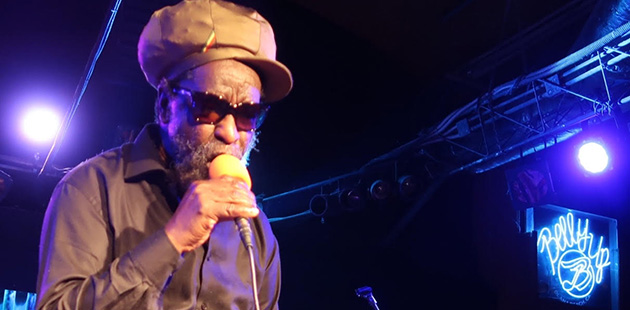Black Uhuru’s Duckie Simpson: ‘I’m a Nine-Star General Now’
After watching legendary reggae band Black Uhuru perform in September of 2016, I wrote, “Duckie Simpson is an ageless, still spry reggae icon; like fine wine, his artistic beauty and complete mastery of reggae music has only matured over the years, ripening and deepening in its richness and maturity.” Over two years later and coming off of the September release of “As the World Turns,” the first new Black Uhuru album in over fifteen years – a superb addition to Black Uhuru’s discography that received a Grammy nomination for Best Reggae Album – Simpson is now more like an extremely rare VSOP (very superior old but not pale) cognac: robust and full of flavor, roots, and culture; when he sings or speaks about reggae music, it’s an experience to be savored.
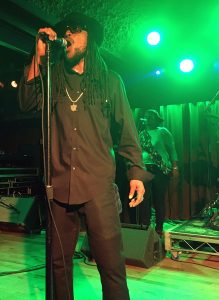
So on March 12, when I had the opportunity to see Black Uhuru perform a riveting set at the Belly Up Tavern in Solana Beach, California, and afterward, when I was invited on the band’s tour bus to interview Duckie Simpson, I was conscious of the privilege I’d been given, and was determined to make the most of it. For approximately forty-five minutes, Simpson and I spoke about: the Grammy Awards; the making of “As the World Turns”; songwriting generally; ganja; Rastafari; the return of reggae superstar Buju Banton to Jamaica; his relationship with former Black Uhuru bandmates Garth Dennis, Don Carlos, and Michael Rose, and much, much more. What follows is a transcript of the interview, modified only slightly for clarity and space considerations.
Q: Greetings, Mr. Simpson. Fantastic show!
Duckie Simpson: Thank you.
Q: I heard you being interviewed [just a few days ago] on Hawaiian Public Radio, and you were saying that you were just recovering from being sick.
Duckie Simpson: Very, very sick.
Q: You said you got sick in Los Angeles?
Duckie Simpson: I came up for the Grammys. And the rain fell on me, man. And it’s funny: I’m from the tropics, but whenever rain falls on me, I get sick. I can’t figure it out. So I got sick in L.A. And I was sick for like three f*cking weeks. Not sick, but I had a cold, and you know when you have a cold your voice get f*cked. So I was kinda struggling tonight. I’ve been struggling for a couple of shows.
Q: Well just so you know, I couldn’t tell.
Duckie Simpson: I’m glad you say that.
Q: I got some very good footage of you singing –
Duckie Simpson: It’s funny. I saw you in the audience, and I knew you was that guy Robbie’s [Black Uhuru Booking Agent/Tour Manager Mr. Robert Oyugi] been talking about.
Q: Well I’ll always remember, you were one of the first reggae artists I interviewed, in September of 2016. And I had [recently] stopped practicing law and [had] started to interview reggae artists. And you were so nice to me.
Duckie Simpson: (Laughing) You were practicing law? Why are you interviewing reggae artists?
Q: Why do you think? I couldn’t take Babylon’s rules anymore.
Duckie Simpson: (Laughing) So I was really cool to you?
Q: You were awesome to me. And you taught me a lot. So I know I’m going to learn a lot tonight. When I listened to your interview on Hawaiian Public Radio, you were asked about the Grammys this year. You said you knew that Sting and Shaggy were going to win. And you hypothesized this was because in recent years Shaggy has both performed and presented at the Grammys –
Duckie Simpson: 2018 Shaggy performed at the Grammys. And Shaggy host the Grammys in 2019. So I knew he was going to win.
Q: It was inevitable?
Duckie Simpson: Yeah. Yeah.
Q: Your album “As the World Turns” which was of course [also] nominated for [Best Reggae Album] wasn’t released until September 7th [2018], very close to the deadline for Grammy consideration.
Duckie Simpson: Yes.
Q: Do you think the late release date might have hurt Black Uhuru’s chance to win this year –
Duckie Simpson: No. The Grammys [are] like the Miss Universe beauty [contest]. They know who is gonna god*amn win before the sh*t is even [held officially], you know?
Q: So they’ve chosen the winner early?
Duckie Simpson: A long time ago! That’s how it is. I knew Shaggy was gonna win.
Q: Did you see Shaggy and Sting at the awards ceremony?
Duckie Simpson: No. But I saw Shaggy onstage; Shaggy was hosting. And when he got the Grammy he big-up’d Black Uhuru and the rest of the guys dem. And that was great. But Shaggy is my boy, you know? I like Shaggy.
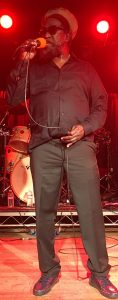
Q: You’ve known him for a long time?
Duckie Simpson: No. I don’t “know” him. I’ve met Shaggy officially maybe one time.
Q: But you respect his music?
Duckie Simpson: Yeah, well I like him. I like the guy and his music, yeah.
Q: Now even though Black Uhuru didn’t win this year, it must have been very pleasing to you after having not released an album for over 15 years for Black Uhuru to be nominated –
Duckie Simpson: Yeah, [it] was. This is my 7th or 8th nomination. Won the first time.
Q: Even though you’re [understandably] pleased to be nominated [again for “As the World Turns”], when I interviewed you in 2016, you very candidly told me that the Grammy Awards and the whole ceremony, and that industry, doesn’t respect reggae music.
Duckie Simpson: No, they don’t. I only went to the Grammys because I was pressured to go. And my executive producer [Mike Gener] is a young guy from California. And this is his first venture into reggae. And you know, he was kinda excited. So you know, I wanted to go with him. And some of the other producers wanted to go, some of my friends wanted to go, I [know] a lot of people there, you know. So I had to go.
Q: What could the Grammys do to make the awards fairer and more meaningful for reggae artists and fans?
Duckie Simpson: That Grammy I won [in 1985 for the album “Anthem”], I was the first person who went on the rostrum. After that everybody who won the Grammy for reggae got it backstage. So that was the first disrespect. So the year before last when Morgan Heritage won the Grammy, they gave it to him upfront, so they changed that aspect of it. But the people dem who vote for the Grammys, they don’t really know about reggae. They don’t have a clue.
Q: The people who are on the committee?
Duckie Simpson: Yeah, they don’t have a clue.
Q: [Turning to] the new album “As the World Turns,” I saw when I was reading about the album that this album was in the works for [a] long [time].
Duckie Simpson: It’s a remake of an album. I [made] the album six years ago. I lost the file. I lost everything.
Q: What I read about it was that the file was corrupted. Was it corrupted or lost?
Duckie Simpson: When you say “corrupted,” what do you mean?
Q: That’s what I wanted to ask you –
Duckie Simpson: The file got mislaid. And some of the mixes I was not pleased with. So I scrapped the album. And I completely redid the album. Up in L-town. You ever heard of L-Town? Up in northern California?
Q: That’s where King Hopeton has his studio, the Double Lion?
Duckie Simpson: (Laughing) You know King Hopeton?
Q: For sure.
Duckie Simpson: (Laughing) King Hopeton is one of the producers. And King Hopeton played a lot of the stuff and recorded and everything.
Q: It’s a very, very tight production.
Duckie Simpson: Yeah.
Q: And I was thinking one of the reasons why it might be such a tight production [in part] is because you had to do it over. Sometimes when you have to do something over –
Duckie Simpson: It was easy because I had to do it over. I knew the songs, we knew the arrangements, yeah everything was easier.
Q: Now I know you recorded the album both in California and Jamaica [using] strictly analog equipment. Is that true?
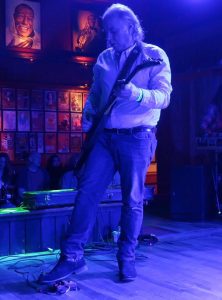
Duckie Simpson: Not strictly. On the drums, we used drum machines but we did overdub with analog drums, with real drums. The basics [were] done with drum machines. Then we overdubbed real live drums, you know? And everything else was analog.
Q: There’s a lot of debate in the industry about the difference between analog and digital [recording equipment]. Is there a difference in terms of recording reggae music? Does it matter?
Duckie Simpson: Well I use both, but it doesn’t matter to me. The chemistry is within the lyrics. That’s where the strength is. So if you analog or drum machine, it depends on what you’re singing.
Q: In addition to top-notch sound quality, this album is really an excellent addition to Black Uhuru’s legendary discography. Although it’s very fresh sounding, it maintains and is consistent with a lot of the elements that have made Black Uhuru one of the most famous reggae bands –
Duckie Simpson: I know.
Q: The way I would describe the album is: It’s classic roots reggae with a modern edge; militant, meaningful, and spiritual.
Duckie Simpson: You don’t have to say no more. You classify it the right way. Because it’s old school with a modern edge; yeah, you’re right. Those two Bob Marley songs . . . that Bob Marley song I covered –
Q: Stand Alone?
Duckie Simpson: Yes.
Q: And then African Herbsman? I mean, Jamaica Herbsman –
Duckie Simpson: You know that’s not Bob Marley? That’s Richie Havens.
Q: Richie Havens, that’s right.
Duckie Simpson: Yeah. Richie Havens did “Indian Rope Man.” And Bob Marley did “African Herbsman.”
Q: And on the [new] album there is also a Peter Tosh cover?
Duckie Simpson: Yeah, “Jah Guide,” with me and Bugle. And there’s a cover with me and Agent Sasco, [“Stronger”].
Q: I noticed from reviewing the liner notes that you wrote [most] of the songs [on this new album] with Ashaki Simpson. Is Ashaki your son?
Duckie Simpson: No. Ashaki, she’s a girl.
Q: Is that your daughter?
Duckie Simpson: Yeah, yeah.
Q: Is she a musician, too?
Duckie Simpson: No, no.
Q: She’s strictly a songwriter?
Duckie Simpson: Yeah.
Q: How long have you been writing songs with her?
Duckie Simpson: I think this is the first [time with] her. This is the first venture for her.
Q: Can you describe your process a bit. How are you able to write such meaningful songs together – [you and your daughter]?
Duckie Simpson: You write different ways. Sometimes it’s an experience. Sometimes, it’s like – like “Betrayal,” you know that song?
Q: Yeah.
Duckie Simpson: That song was written about a girl who was dreadlocks by day –
Q: And blonde by night. (Laughing)
Duckie Simpson: – blonde by night (nodding). War Crime is about war crimes you are committing in America. The atrocities. Against these guys I’m talking about: Saddam Hussein, Gaddafi, Chávez. You know?
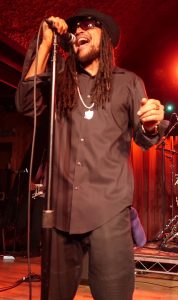
Q: So a lot of different things can cue you to write songs?
Duckie Simpson: Yeah. Exactly. Sometimes it’s just gimmicks. Sometimes it’s not even real. The lyrics just flow, you know? But I usually use topics when I’m writing. I look for a strong topic. [Like in the song] “Emotional Slaughter,” you know?
Q: That was a song I read that you wrote when you were on an airplane after Bob Marley and [Sandra] “Puma” [Jones] had died –
Duckie Simpson: Yeah, yeah.
Q: You were thinking about them when you wrote those lyrics –
Duckie Simpson: Definitely. If you listen to some of the lyrics dem [you can tell]. Yeah, definitely.
Q: It’s a very meaningful song. Now [you] just mentioned [the song] War Crime. That’s perhaps the most militant and political song on the album.
Duckie Simpson: It is.
Q: It’s a very interesting song because it mentions a number of dictators: Mengistu, Gaddafi, Chávez, but at the same time –
Duckie Simpson: [And] AB. You know who AB is?
Q: Who is AB?
Duckie Simpson: AB was the Iranian guy. What’s his name again?
Q: Oh. Mahmoud Ah[madinejad]?
Duckie Simpson: (Laughing) I couldn’t remember his name, so I say AB. And he was very smart. Because he got out at the right time. They was gonna F*ck him up.
Q: The U.S. was?
Duckie Simpson: (Nodding) Remember I wrote this song six years ago. So I was telling Chávez –
Q: Watch out. Watch your back.
Duckie Simpson: Yeah.
Q: It’s a very tough song on the United States. What is the most important message you want listeners of that song to take away from it?
Duckie Simpson: War Crime?
Q: Yes.
Duckie Simpson: Well all of it. It’s a message there. The message is that the president should be charged for war crimes. Obama and Clinton should be. America has committed a lot of war crimes. Them kill the calf. Them kill Gaddafi. Yeah.
Q: “Ganja Baby” and “Chalice” are two of my favorite songs on the new album. Chalice has a super chill vibe to it –
Duckie Simpson: (Laughing) Chalice is just a ganja song.
Q: The official video you made fits the song perfectly –
Duckie Simpson: Yeah, that was my ganja fields. All those ganjas was mines. It’s funny, you know? I still can’t figure it out. It’s not one of my favorites. But a lot of people like Chalice.
Q: It has a really good vibe to it and it’s creative.
Duckie Simpson: [And] Ganja Baby is about these guys in Jamaica who don’t smoke ganja. (Laughing)
Q: Well I want to ask you about that. But let me ask you first about [your ganja] field. That’s in Saint Ann’s Bay [Jamaica]?
Derrick Simpson: That’s in Saint Elizabeth’s. They call it Saint Bess, too. Same place. That’s [on] the south coast.
Q: I’m coming to Jamaica in February of next year, so if you’re gonna be there –
Duckie Simpson: I’ll be there.
Q: Can I visit your herb field?
Duckie Simpson: Yeah mon.
Q: Sweet. Maybe we can hang out and listen to some Black Uhuru. When you’re touring who takes care of your herb field?
Duckie: I got my own farmer. I plant a lot of vegetables, man.
Q: And when you’re not touring [is that where you stay,] in the country?
Duckie Simpson: That’s where I live. I got a house in Kingston. And I got a rented place in Saint Elizabeth’s. But I go to Saint Elizabeth a lot. So it makes sense for me to rent a flat there.
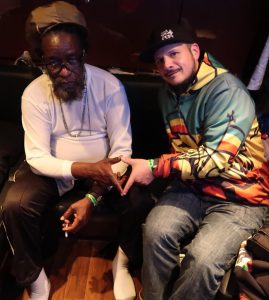
Q: Now that there are less restrictions on marijuana in Jamaica and you see medical marijuana shops are opening for business, is there a chance that this marijuana boon will pass down to the Rasta farmers, so that they [too] will also realize [a] financial benefit? Or will [the boon belong only] to the wealthy, corporations, and foreigners?
Duckie Simpson: It won’t pass down to no Rastas. This is a billionaire business. In Jamaica, small man is not gonna get a play. He’s just gonna be a laborer. See the Jamaican government, the politicians, [they are] run by the American government.
Q: You were talking about [the song] Ganja Baby [a moment ago]. It’s a very joyful and creative tune. There’s a part of the song where you sing: “Take a little trip and me reach to Aruba. Who me sight? The one, Baruka. Say him naw burn naw sense . . . .” And I was curious about this lyric [which] alludes to the famous Rastafarian dub poet, Mutaburuka.
Duckie Simpson: Yeah, yeah.
Q: In a book called Rastafari: A Very Short Introduction by professor of sociology Ennis Edmonds, who was born and raised in Jamaica, Edmonds writes: “Rastas, Mutaburuka being the most prominent of these[,] claim that they do not partake in smoking ganja.” According to Edmonds, these Rastas say “they have already achieved such a high level of consciousness that smoking the holy herb is no longer necessary.”
Duckie Simpson: I don’t think Muta said that what he wrote. These professor guys they all think they know about Rasta. They don’t know sh*t about Rasta (Laughing). They just prophesize. They’re all imposters. But they write the most things about Rasta. Muta just don’t smoke. Some people don’t smoke. Whether it’s ganja or cigarettes or whatever it is. The guy’s just not a smoker. Has nothing to do with Rasta.
Q: In April 2017 I interviewed Don Carlos here at the Belly Up [Tavern]. And I specifically asked Don if, despite any negative history that exists, whether he and you could ever get back together, and be like the original Black Uhuru. And Don said: “I don’t carry any grievance. I don’t say we can’t get together again. We can.” What is your reaction and would you ever be willing to sing again with Don Carlos in any capacity?
Duckie Simpson: Well at this age now that don’t seem possible. We’re old guys now, man. When is that time? When is that opportunity going to arrive? I don’t see that opportunity arriving.
Q: If the fans clamored for it like once before when you guys reunited. I know that that happened at a very famous reggae festival –
Duckie Simpson: And it almost cost me my name. That reuniting with Don and Garthie was a big, big, big mistake. It almost cost me. Because we end up in court fighting for the name. Me and Don and Garthie were together. Me and Garthie were together, formed Black Uhuru, and we recruited Don.
Q: Don lived in a place called Balmagie?
Duckie Simpson: Yeah, same place. Don is from Balmagie. I am from Waterhouse. Garthie is from Trenchtown, and he came to Waterhouse.
Q: Balmagie is in Waterhouse?
Duckie Simpson: Yeah, yeah, yeah. And we did two or three songs [together as Black Uhuru]. Don went solo. Garth went with Wailing Souls. And after eighteen years, I even won the Grammy, won a lot of things. And [after] eighteen years, I invited Don and Garthie back into the group. To work. And they tried to overthrow me for the name. They said they “owned” the name [“Black Uhuru”].
Q: So let me put this on the table, too. Because I have to ask you, I feel it’s important to ask you. [You see] I also interviewed Garth Dennis.
Duckie Simpson: Oh? He’s like a little wimp.
Q: I interviewed him last summer. And I know that what I am about to tell you is likely to upset you.
Duckie Simpson: It cyan’t upset me. ‘Cause I hear all kinda sh*t.
Q: [Garth Dennis] said that you and he were “very close” when you first started out. He said: “Duckie used to stay with me at my house when the group was formed at 14 Balcombe Drive. That’s where he used to stay when I first put the group together.”
Duckie Simpson: When he put the group together? Garthie was a guy working 9 to 5. He didn’t put sh*t together. Garthie come from a musical background. Garthie’s sister, Beverley Kelso, sang with Bob Marley. Bob Marley rehearsed in Garthie’s yard.
Q: Joe Higgs is Garth’s brother-in-law.
Duckie Simpson: Joe Higgs rehearsed in Garthie’s yard. Wailing Souls. All dem guys. That’s where Garthie comes from. When I met Garthie in Waterhouse, Garthie was a customs broker. He was a 9 to 5 baldhead. He’d never sang a f*cking song in his life until he met me. He was from a singing background, but he wasn’t a singer. I was the one who enlightened him into singing. When he met me, I [was] a young singer.
Q: Garth also said: “The name [Black Uhuru] was given to I-man, Garth Dennis.” Garth said the person who gave him the name is still alive, and his name is Roy Palmer.
Duckie Simpson: So you believe that? If the name was given to Garth Dennis, why is he out in the cold? Listen this: I and Garth was sitting on a wall when that guy – we know the guy – he comes from Waterhouse. The guy was passing us. I had my guitar. And he said, “Hey, you guys have a name?” And we said, “No, not really.” And he said, “I have a name for you guys.” And he says, “Uhuru.” If it was Garth’s name, where is Garth now? That was mentioned in the court. In Los Angeles Supreme Court. That argument [about the] guy. The guy even came to court and gave evidence for [Garth]. And told the judge that he was the one who gave Garthie the name. And the judge said “bullsh*t.” Whether the guy give Garthie the name or not – which he didn’t, he asked us if we had a name – if the name was Garth-owned, he abandoned it. Where is he? Where was he? He [also] says he was the one that formed Wailing Souls. And he formed Black Uhuru. And he’s f*cking out in the cold. So I can’t put a picture on that. If the name was his, why isn’t he singing, [and] why doesn’t he have it? We went to the Los Angeles Supreme Court – for thirteen days the trial took.
Q: Do you want me to tell you what [Garth] said about that?
Duckie Simpson: (Nodding)
Q: What he said was that earlier there was a case in Jamaica –
Duckie Simpson: It wasn’t a case. It was an injunction.
Q: He said he won in Jamaica [but] his lawyers in the U.S. never brought that up in California. And if they had [brought that up], that he had won [a case about the name of the group, Black Uhuru] where the group was formed, things would be different.
Duckie Simpson: (Laughing) He didn’t win a case in Jamaica.
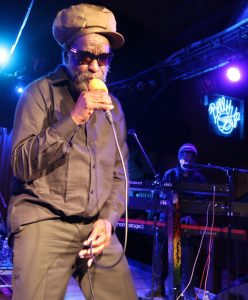
Q: It was an injunction? It was [surrounding] a concert –
Duckie Simpson: The year before that injunction, he didn’t tell you that I won an injunction [against him], right?
Q: No.
Duckie Simpson: Alright. He and Don was gonna do this big concert in Jamaica. And I put an injunction on them [about] that concert.
Q: That they [couldn’t] perform under the name “Black Uhuru.”
Duckie Simpson: Yes, yes. The next year, they did the same thing. But what my lawyer did in Jamaica, she used the same documents that she used the year before. To file back the injunction for the next year. And the judge said that can’t work. So [Garth and Don] won the injunction [that year due to that]. It wasn’t a trial [like the one that later took place in Los Angeles]. It was an injunction stopping them from doing a concert.
Q: I can’t remember a time before where we have seen a Black Uhuru album where you have been the frontman on every song.
Duckie Simpson: This is the first album.
Q: So is this an album where you are putting your [stamp] on things? Saying, “hey, this has always been my –
Duckie Simpson: I ain’t putting no statement [with the new album]. I won the case in 1998 in Los Angeles Supreme Court [over the use of the name Black Uhuru].
Q: So the fact that you sing on every song [on this new album] has nothing to do with that?
Duckie Simpson: Nah. When we went to court, the judge said the name was mine. Now after thirty-four years, [former Black Uhuru member] Michael [Rose] is now fighting for the name[, too]. (Laughing)
Q: I read about this in October [of last year]. You told the [Jamaican newspapers] that the case [involving Michael Rose] might go to arbitration?
Duckie Simpson: Yeah, it’s in arbitration. Michael Rose joined Black Uhuru. Black Uhuru already existed before Michael Rose. [It’s been] thirty-four years now since Michael Rose left the group. Now he has just realized that he is the voice of Black Uhuru. So who the f*ck am I?
Q: Last time I [interviewed] you, you said [Michael Rose] is like the wasp who everyone thought could produce the honey, but that he never was able to.
Duckie Simpson: He make the comb. But he couldn’t make the honey. I read the other day where Michael said me and him have some internal problems. Me and Michael don’t have no f*cking problem. I’m the general. Michael is a foot soldier. I’m [the] general. I grow Michael Rose.
Q: Five-star general?
Duckie Simpson: I’m nine[-star] now. (Laughing) I grow Michael Rose. I know Michael Rose from he was sucking his f*cking finger. From when he was five or six years old. I teach Michael Rose to sing. I teach Michael Rose about Rasta.
Q: All these attacks you’ve received over the decades from the various [former band members] who’ve been in Black Uhuru, do you have times where it upsets you, or do you laugh at it, or both?
Duckie Simpson: I know that’s how people are. People are devious. And people are wicked. And I am not a sociable guy. I don’t trust f*cking people. I don’t need friends and stuff like that. If you should interview all of Michael Rose’s friends from Waterhouse, they’ll tell you he’s a [derogatory term]. Seen? Michael Rose is one of the weirdest [derogatory term] you can ever – don’t let that guy fool you with his acting nice. He’s a bitch. All of my problems in Black Uhuru is women.
Q: Really?
Duckie Simpson: Yes. Garthie’s woman. Garthie’s girl from California. She’s the one who break the group up.
Q: [Garth’s] wife?
Duckie Simpson: Yes. She is the one who break up Black Uhuru.
Q: One of the things [Garth] said when I interviewed him was that you had stayed at his house. And that before you left –
Duckie Simpson: But he didn’t tell you I stayed on the floor.
Q: No.
Duckie Simpson: Oh, okay. That’s what he should tell you. I had to sleep on the f*cking floor. He didn’t have a f*cking bed in California.
Q: And then [Garth] said that when you stayed at his house [that] before you left, you took his wife aside and said, “Don’t you know that Garthie formed the group?”
Duckie Simpson: I don’t know about that. This guy is hallucinating. These guys are bitches man. They are f*cking liars. Michael Rose and all of them. When I met Garthie I was a natty dread Rasta. Garthie can’t tell me sh*t. Seen?
Q: Were you in Jamaica when Haile Selassie visited?
Duckie Simpson: Of course.
Q: Did you go to the airport?
Duckie Simpson: No. Tried to see him over the boulevard. He passed close by our hometown. So I was trying to see him when he was passing close by. Didn’t make it.
Q: What do you remember about that time in Jamaica, about the way that the people felt when [Haile Selassie I] came [to Jamaica,] and after he left, what was the groove like? What was the conversation in the streets about the fact that [Selassie] had just been there?
Duckie Simpson: You have to understand the people dem in Jamaica do not like Rasta. So they were all trying to act like we were all stupid.
Q: For thinking it was great that [Selassie] had come to Jamaica?
Duckie Simpson: Yes. They didn’t like Bob Marley neither, don’t let them fool you.
Q: Initially?
Duckie Simpson: (Laughing) (nodding) Don’t let them f*cking fool you. All these baldhead singers in Jamaica. All these singers that used to sing rocksteady and ska? They hate Bob Marley. All of them. I am from that era. I’m sixty-f*cking-nine. Garthie took me to Trenchtown. And that’s how I knew Bob [Marley]. And Bunny [Wailer]. And Wailing Souls and all dem guys.
Q: When you were around Bob Marley and the Wailers, [did you observe] what has often been written, that because [Bob Marley] was of mixed race he was often picked on because of his skin color. Is their truth to that?
Duckie Simpson: Yeah. Yeah. That’s why he became so tough. He was the only red guy in like tons of black guys. And these black guys were Rasta. Serious Nyabinghi. Death to black and white oppressors, you know? So Bob Marley was trained. Bob Marley was tutored by a Rasta named Mortimo Planno. He was my tutor also. At the age of 15, I was hanging with Mortimo Planno. He was from Trenchtown. He was the most educated Rasta. This guy [knew] everything.
Q: When you think about Bob Marley, what personal memories come to mind?
Duckie Simpson: I see a man who was crushed by f*cking poor people. I learned from Bob Marley that you cannot satisfy people. That’s where I learned that people are evil. And wicked.
Q: Because they always want more [from you]?
Duckie Simpson: Yes. And no matter how much you give them, they’re still aching. All these guys around Bob Marley, they were all dreadlocks. All of them professing Rasta. And when Bob died, they all f*cking trim.
Q: I read another book by that same [Jamaican] scholar [Ennis B. Edmonds], it’s called Rastafari: From Outcasts to Culture Bearers. And he wrote in this book: “Rastas regard themselves as the agents of Babylon’s destruction and reggae music as their primary weapon.”
Duckie Simpson: We ain’t no agent of no Babylon destruction. F*ck that! And our primary weapon is Nyabinghi. Not f*cking reggae. This guy don’t know sh*t he’s talking about. He’s not a Rasta. He cannot write about Rasta. Where does he get his experience? He doesn’t praise Selassie. What makes you Rasta? You have to praise Emperor Haile Selassie I. If you don’t praise Emperor Haile Selassie I, you ain’t no f*cking Rasta.
Q: The reason why I brought it up is because it made me think of your song Five-Star General [on the new album] where you sing, “my lyrics on my hip keep scratching like a glock.”
Duckie Simpson: Of course.
Q: Let me make sure I understand: Nyabinghi is when Rastas congregate and reason with each other, and play Nyabinghi drums –
Duckie Simpson: That’s a Nyabinghi, yeah. Like 7 or 9 days of drumming. Reasoning.
Q: [It’s called a] “grounation”?
Duckie Simpson: Yes. And that is the most potent music of Rasta. Not reggae. You have some Rastas who don’t want to hear sh*t about reggae.
Q: I know there are a lot of different mansions of Rastafari.
Duckie Simpson: Not a lot. Only three.
Q: Nyabinghi. Bobo dreads. And –
Duckie Simpson: Twelve Tribes. Only three.
Q: Can I ask, which one do you –
Duckie Simpson: Me? Nyabinghi. I’m not a Bobo dread. Because I don’t praise Emmanuel. I praise Selassie. I don’t praise Marcus Garvey.
Q: [Reggae star] Anthony B is a Bobo dread.
Duckie Simpson: Yeah, yeah. You can know them by –
Q: Their very distinctive headwraps?
Duckie Simpson: Yes. And then they say “Emmanuel” before Selassie [when giving praise].
Q: And then most of the [Bobo dreads] live in Bull Bay [in Jamaica]?
Duckie Simpson: That’s [where] their headquarters [is].
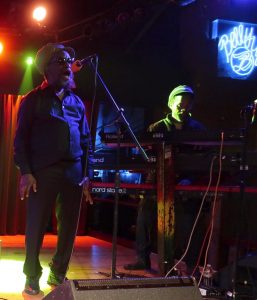
Q: There’s [been] a lot of talk about Buju Banton and his return to Jamaica after having served that [harsh] sentence [in the U.S.] There were a lot of different reactions in Jamaica from reading the news about it. Some people were thinking he shouldn’t have gotten a hero’s welcome. And some people who felt that all of the attention that was paid [to Buju Banton] should have been paid. Do you have any particular opinion about this?
Duckie Simpson: I tell you some people are f*cking wicked. They have no control over that. The guy is a superstar. And the guy has his fans. And the guy went to prison for some drugs or whatever. And that’s Buju Banton, man. The man is a mega-superstar! Going to prison for 9 years ain’t going to do sh*t. That’s Gargamel. He’s always going to be a big star.
Q: Mr. Simpson, it’s an honor to talk [with] you always. Is there anything that you want the world to know about Black Uhuru, about the “state of reggae music,” about Jamaica, or about Rastafari, or anything [else]?
Duckie Simpson: Well trust me, you know? All of that is in my music. If you listen to my music [it’s] about Rasta, Jamaica, [and] reggae music. It’s all [in] there. And I am not necessarily trying to make people know sh*t. Because people know what they want to know and think what they want to know. You gotta be careful of the fans, you know?
Q: You don’t want to preach too much to them?
Duckie Simpson: No, I don’t preach. I didn’t say sh*t on stage. You notice that? Black Uhuru is the only [band] who doesn’t talk on stage.
Q: Just sings?
Duckie Simpson: (Nodding) We ain’t no preacher. And I ain’t trying to convert nobody. All of these motherf*ckers who are wicked? They need to go. So I’m not a guy who is here to preach sociality. Or try[ing] to teach people’s children. Or trying to save souls. That’s not my role. A lot of these souls need to burn. I’m just singing logical stuff. You can either deal with it or you don’t deal with it. But I’m not into preaching.
•••• •••• ••••• •••• ••••
About the Author: Stephen Cooper is a former D.C. public defender who worked as an assistant federal public defender in Alabama between 2012 and 2015. He has contributed to numerous magazines and newspapers in the United States and overseas. He writes full-time and lives in Woodland Hills, California. Follow him on Twitter at @SteveCooperEsq
Photos by Stephen Cooper

Stephen Cooper is a former D.C. public defender who worked as an assistant federal public defender in Alabama between 2012 and 2015. He has contributed to numerous magazines and newspapers in the United States and overseas. He writes full-time and lives in Woodland Hills, California. His twitter is: @SteveCooperEsq

